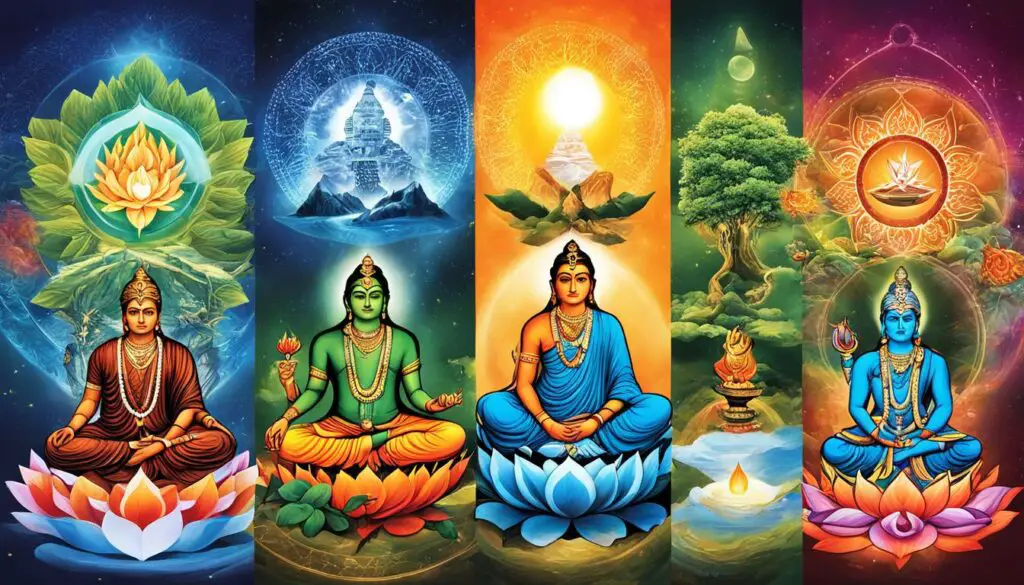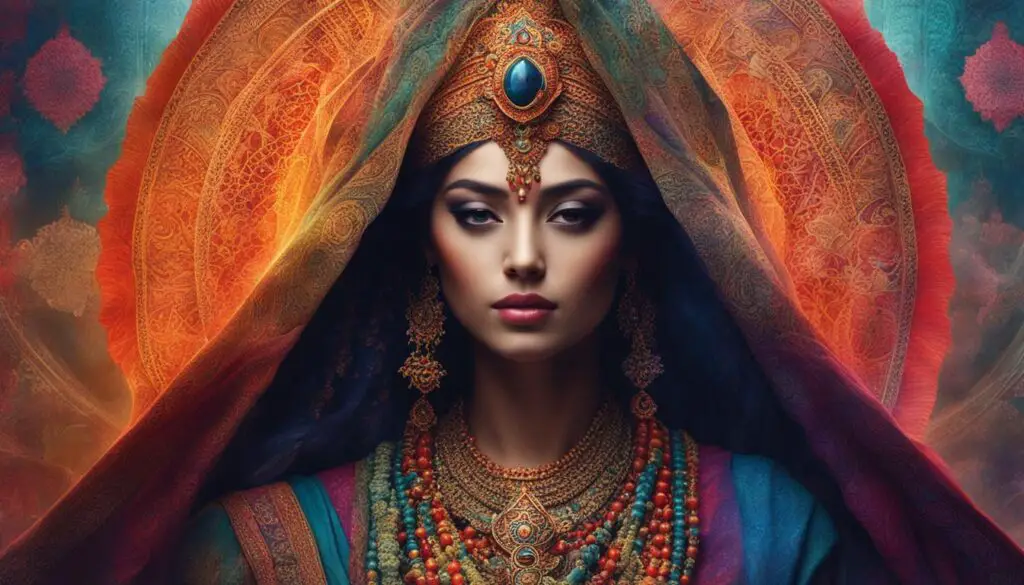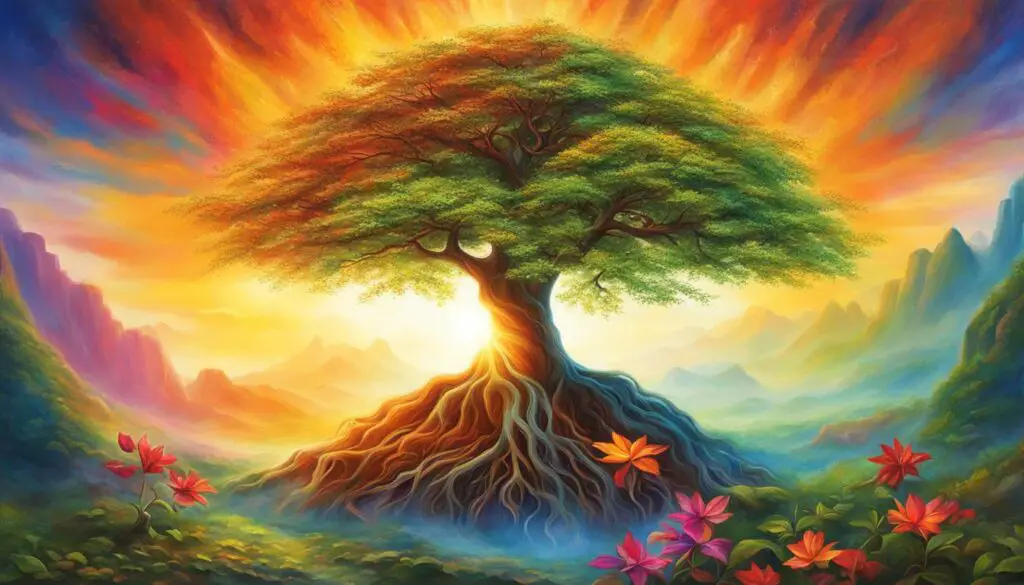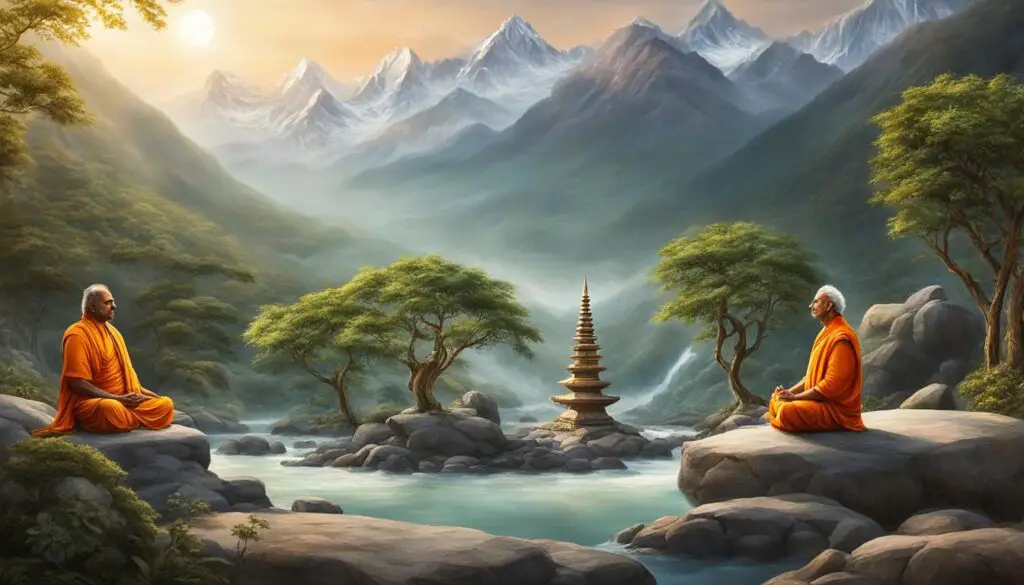Vedanta is a spiritual tradition explained in the Upanishads, which originated from the ancient Arya people or Aryans and was taken to India, inhabited by the Dravids at the time. It is a mystical philosophy that combines elements of Samkhya philosophy. Vedanta is characterized as knowledge that seeks to understand the real nature of reality (Brahman), being defined as reality, consciousness and beatitude. The word Vedanta can be interpreted as “the summit of knowledge” or “the essence of the Vedas”.
Main points covered:
- Vedanta was introduced to India through the ancient Arya people or Aryans.
- It is a philosophy that seeks to understand the real nature of reality.
- It combines elements of Samkhya philosophy.
- The term “Vedanta” means “the pinnacle of knowledge” or “the essence of the Vedas”.
Meaning and Fundamentals of Vedanta
Vedanta encompasses the spiritual laws that are common to religious and spiritual traditions throughout the world. Your goal is to achieve a state of self-realization or cosmic consciousness. It is neither a philosophy nor a religion, but a metaphysical doctrine. A essence of Vedanta is to understand the unity of the Self as the supreme ruler of all phenomenal activities and as an indifferent witness to everything that occurs. The attitude of the student of Vedanta must be one of faith in the possibility of discovering the truth and a sincere desire to free oneself from the bondage of limited existence.
The Three Phases of Vedanta
Vedanta has gone through three phases throughout history. A formative phase occurred between 1000 BC and 300 BC, with the development of basic concepts in sacred scriptures. During this phase, the Upanishads were written, providing the philosophical basis for Vedanta. These texts explore the nature of being, the existence of a supreme being, and the interconnection between the individual and the universe. They are considered the primary source of Vedanta teachings.
A scholastic phase of Vedanta took place between the 8th and 13th centuries A.D. During this period, there was intense intellectual activity and philosophical debates within the Vedanta tradition. Different schools of thought emerged, each with its own interpretation of ancient texts. These schools, like Advaita Vedanta, Vishishta-advaita Vedanta and Dvaita Vedanta, developed distinct philosophical systems that address concepts such as the nature of God, the relationship between the individual and the divine, and the purpose of life.
A modern phase of Vedanta began in the 19th century with Sri Ramakrishna e Swami Vivekananda. These masters brought a renewal of the tradition, presenting a more universal and practical approach to Vedanta. They emphasized the importance of direct experience of God and the application of the teachings of Vedanta in daily life. This approach has rejuvenated Vedanta, making it more accessible to people of different backgrounds and beliefs.
| Phase | Period | Features |
|---|---|---|
| Formative phase | 1000 BC – 300 BC | Development of basic concepts in the sacred scriptures (Upanishads). |
| Scholastic phase | 8th – 13th century AD | Philosophical debates and the emergence of different schools of thought. |
| Modern phase | XIX century | Renewal of tradition, more universal approach and practice of Vedanta. |
Na formative phase, Vedanta laid the foundation for understanding supreme reality and the spiritual path. During the scholastic phase, different schools of thought have expanded and interpreted these concepts in unique ways. And on modern phase, Vedanta was rejuvenated and became relevant to the challenges of contemporary society.

Main Philosophical Schools of Vedanta
Vedanta gave rise to three main philosophical schools that played a fundamental role in the development and diversification of this spiritual tradition. Each school has its own interpretation and approach to Vedanta philosophy, offering unique perspectives on the nature of Vedanta. supreme reality and the relationship between the individual self and the universal self.
Advaita
One of the most prominent philosophical schools of Vedanta is the Advaita, proposed by Shankara. This school defends the non-duality between the individual (Atman) and the supreme reality (Brahman). According to the Advaita, all phenomenal manifestations are illusory and arise from ignorance and mistaken identification of the self with the body and mind. Liberation is achieved through knowing the true self, recognizing the identity between the individual and the ultimate reality.
Vishishta-advaita
O Vishishta-advaita, proposed by Ramanuja, supports a qualified non-dualism. According to this school, Atman and Brahman are one unity, but there is a qualified differentiation. Ramanuja emphasizes the idea that the individual self is always interconnected with the ultimate reality, but is not exactly identical with it. In this way, the relationship between the individual and the supreme reality is seen as a relationship of unity and difference simultaneously.
Dvaita
The third philosophical school of Vedanta is the Dvaita, proposed by Madhya, who defends dualism. According to this school, the individual and ultimate reality are distinct and separate entities. Madhya argues that the relationship between the individual and the ultimate reality is similar to the relationship between the servant and the master. The aim of life is to develop devotion and servitude to the supreme being to achieve salvation.
These philosophical schools of Vedanta continued to be debated over the centuries, influencing the development of the tradition and understanding of the nature of existence. Each offers a unique perspective on the relationship between the individual and ultimate reality, providing different paths to spiritual fulfillment.
| Philosophical School | Main Proponents | Our Approach |
|---|---|---|
| Advaita | Sankara | Non-duality between the individual and the ultimate reality |
| Vishishta-advaita | Ramanuja | Qualified non-dualism, unity with differentiation |
| Dvaita | Madhya | Dualism, separation between the individual and the supreme reality |

As philosophical schools of Vedanta offer a variety of perspectives and approaches to understanding the nature of reality and the relationship between the individual and the divine. Each school contributed significantly to the development and deepening of the Vedanta tradition, enriching its spiritual and philosophical legacy.
The Concept of Unity in Vedanta
Vedanta emphasizes the unity of existence as one of its main themes. According to her, the divinity is present everywhere, and everything we see and experience is a manifestation of this unity. Vedanta seeks to overcome separation and the sense of individuality through knowledge of our true divine nature. Through this knowledge, we can overcome fear, disappointment and sadness, and live a life based on oneness of all things.

This understanding of unit at Vedanta leads us to recognize that we are not separate from each other or from ultimate reality. We connect with the divine present in everything, as a manifestation of supreme reality ou Brahman. By freeing ourselves from illusions and identifying with this absolute reality, we can experience true divinity in all aspects of life.
To illustrate this idea of unity, you can create a table that highlights the key principles of Vedanta related to unity and the divine presence in everything:
| Principles of Vedanta | Unity at Vedanta |
|---|---|
| Divinity is present everywhere | Recognition of the divine presence in all things |
| Everything is a manifestation of the ultimate reality | Vision of ultimate reality as the essence of everything |
| Overcoming separation and a sense of individuality | Understanding the unity of all beings and things |
| The ultimate reality is the true divine nature | Identification with the divinity present in everyone |
This table summarizes the essential concepts of unit at Vedanta, emphasizing the interconnectedness of everything and the divine presence in every aspect of existence. She reminds us that we are all a unique expression of this divine unity, inviting us to live in harmony and love with the world around us.
The Concept of Maya in Vedanta
Vedanta considers Maya as illusion that hides our true divine nature. Maya is what prevents us from seeing reality as it really is. It creates duality, separateness and makes us wrongly identify with the body, mind and ego, causing suffering.
To overcome Maya, we need to seek self-knowledge and understand that our real nature is divine. Through meditation, altruistic action and mental purification, we can dispel the clouds of Maya and realize our divine nature.

The Law of Karma and Reincarnation in Vedanta
Vedanta teaches that we are responsible for the results of our actions, both in this life and in past lives, through the concept of Karma. Everything we do and think creates marks on the mind, which shape our character and influence our future experiences. Karma is directly related to the idea of reincarnation, in which we live several lives to reap the results of our past actions.
Vedanta encourages us to perform virtuous actions and cultivate positive thoughts to create good Karma and advance spiritually. We believe that every action we take, whether physical, verbal or mental, has a consequence that will return to us at some point. Therefore, it is important that we act with conscience and responsibility.
According to Vedanta, the reincarnation is the manifestation of the cycle of action and consequence that occurs over multiple lifetimes. We reincarnate to learn lessons, purify our soul and evolve spiritually. The circumstances of our current life are the result of past actions, and the actions we take now will shape our future existence.
To achieve a state of spiritual liberation, it is necessary to understand the law of Karma and work to accumulate positive Karma. We do this by practicing virtuous actions, such as helping others, being compassionate, cultivating gratitude, and developing self-awareness. It is also important to recognize that all actions have consequences and that we are responsible for our choices.
Vedanta invites us to reflect on our actions, ponder their effects, and seek actions that bring lasting benefits to ourselves and others. Through the cultivation of good thoughts, words and actions, we can create a path of spiritual growth and move towards realizing the true nature of being.
A law of Karma and the belief in reincarnation They are fundamental in Vedanta, as they remind us of the interconnection between all forms of life and the importance of our actions. Through understanding and applying these principles, we can find meaning and purpose in our lives as we seek self-realization and spiritual enlightenment.

| Main Concepts of the Law of Karma and Reincarnation in Vedanta | Overview |
|---|---|
| Karma | Action and consequence of our actions, which shape our present and future lives. |
| Reincarnation | The manifestation of the cycle of action and consequence in multiple lives. |
| Virtuous action | Promote the well-being of others and cultivate positive thoughts and actions. |
| Self knowledge | Understanding our true divine nature and acting in accordance with that understanding. |
| Personal responsibility | Recognize that we are responsible for our actions and their consequences. |
Transformations of Vedanta in the Modern Era
Vedanta underwent major transformations with the arrival of Sri Ramakrishna e Swami Vivekananda in the 19th century. Sri Ramakrishna was responsible for reviving the spiritual experiences of the past and laying the moral foundations of modern India. Swami Vivekananda expanded Vedanta as a universal philosophy of life, making it accessible to everyone, regardless of their religion or ethnic origin. These transformations have brought new vigor to Vedanta and made it relevant to modern challenges.

“Only through selfless action will you find the truth” – Sri Ramakrishna
With the arrival of Sri Ramakrishna and Swami Vivekananda, Vedanta underwent a significant renewal. Sri Ramakrishna, a mystic and philosopher, reinvigorated spirituality in India, seeking God-realization through various spiritual traditions and paths. His inclusive approach and his search for the true essence of all religions opened new horizons for Vedanta.
Swami Vivekananda, a disciple of Sri Ramakrishna, was responsible for bringing Vedanta to the West and making it accessible to all people, regardless of religion or ethnic origin. He traveled extensively, attended international conferences, and promoted a message of unity and understanding between cultures. His teachings and dedication were fundamental in spreading Vedanta beyond the borders of India.
The Expansion of Vedanta
- Swami Vivekananda founded the Ramakrishna Order, an organization that promotes the philosophy of Vedanta throughout the world.
- He established teaching and meditation centers, creating a global network of Vedanta adherents.
- Swami Vivekananda also wrote several works that explain the principles of Vedanta in a clear and accessible way.
The arrival of Sri Ramakrishna and Swami Vivekananda rejuvenated Vedanta and expanded it beyond academic and religious circles. Today, Vedanta is practiced and studied by people of different origins and religions, who find in philosophy a source of spiritual wisdom and guidance for the challenges of the modern world.
Main Masters and Teaching of Vedanta
Sri Ramakrishna and Swami Vivekananda are two of the main masters of Vedanta in the modern era. Sri Ramakrishna, a great sage and philosopher, reinvigorated spirituality in India, exploring the quest for divine realization through various spiritual traditions and paths. His teaching was based on direct experience of God and union with the Divine. Swami Vivekananda, a disciple of Sri Ramakrishna, was responsible for spreading Vedanta in the West, making it accessible to everyone, regardless of their religion or ethnic origin. He emphasized that Vedanta can be practiced by anyone, anywhere, through the cultivation of true devotion, self-control, knowledge and selfless service to others.
The vision of these two great masters of Vedanta brought a spiritual rebirth and a broader understanding of this philosophy. They renewed and expanded Vedanta, making it a practical philosophy for everyday life, capable of awakening the divine potential that resides in every human being. His teachings continue to influence and inspire people around the world to this day.

| Mestre | Contribution |
|---|---|
| Sri Ramakrishna | It reinvigorated spirituality in India, exploring the quest for divine realization through various spiritual traditions and paths. |
| Swami Vivekananda | He spread Vedanta in the West, making it accessible to all and emphasizing the practice of devotion, self-control, knowledge and selfless service to others. |
Conclusion
Vedanta is an ancient philosophical tradition that seeks to understand the essence of reality and the divine nature of the human being. It originated in ancient India, went through different phases throughout history and was transformed by great masters in the modern era. With its teaching of unity, self-knowledge and virtuous action, Vedanta continues to be an important source of spiritual and philosophical wisdom to this day.
Vedanta's main objective is self-transformation and the search for the realization of the highest Self. Through study and meditation in this tradition, practitioners gain knowledge about the ultimate nature of reality, understanding their intrinsic connection with the divine and transcending the limitations of the material world.
Furthermore, Vedanta offers a comprehensive approach to life, addressing issues such as ethics, purpose, happiness and relationships. By understanding the unity of the Self with ultimate reality, practitioners of Vedanta are encouraged to live a life of harmony, compassion and virtuous action.
In short, Vedanta is a powerful philosophy that invites us to explore the depths of our own consciousness, discovering the ultimate truth about ourselves and the universe. With a rich history, solid foundations, and the transformative impact of great masters, Vedanta continues to illuminate the spiritual path and offer guidance to those seeking truth and self-knowledge.
FAQ
Q: Where did Vedanta originate?
A: Vedanta is a spiritual tradition that originated in ancient India, in the Upanishads, brought by the ancient Arya or Aryan people.
Q: What is the meaning and foundation of Vedanta?
A: Vedanta is a mystical philosophy that seeks to understand the real nature of reality, being defined as reality, consciousness and bliss.
Q: What are the three phases of Vedanta?
A: All three phases of Vedanta They are: the formative phase, the scholastic phase and the modern phase.
Q: What are the main philosophical schools of Vedanta?
A: The main philosophical schools of Vedanta are: Advaita, Vishishta-advaita and Dvaita.
Q: What is the concept of unity in Vedanta?
A: Vedanta emphasizes the unity of existence, asserting that divinity is present everywhere and that everything is a manifestation of this unity.
Q: What is Maya in Vedanta?
A: Maya is the illusion which covers up our true divine nature, creating duality and making us mistakenly identify with the body, mind and ego.
Q: What is the relationship between the law of Karma and reincarnation in Vedanta?
A: Vedanta teaches that we are responsible for the results of our actions, both in this life and in past lives, and that Karma shapes our character and influences our future experiences.
Q: What have been the transformations of Vedanta in the modern era?
A: In the modern era, Vedanta underwent significant transformations with the arrival of Sri Ramakrishna and Swami Vivekananda, who revitalized and expanded the teaching of the tradition.
Q: What are the main teachers and teachings of Vedanta?
A: Sri Ramakrishna and Swami Vivekananda are two of the main teachers of Vedanta in the modern era, responsible for renewing and expanding the tradition, making it accessible to everyone.
Q: What is the conclusion about Vedanta?
A: Vedanta is an ancient philosophical tradition that seeks to understand the essence of reality and the divine nature of the human being, and it continues to be an important source of spiritual and philosophical wisdom to this day.







